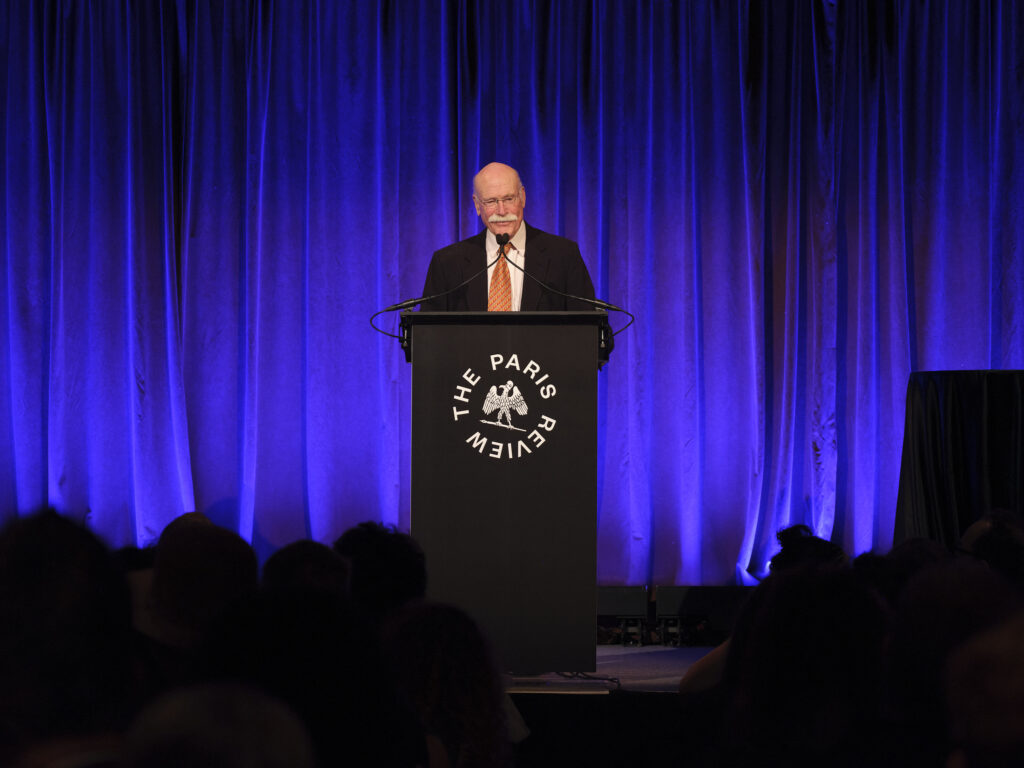
Tobias Wolff at the Spring Revel in 2024.
The Review was thrilled this year to honor Tobias Wolff with the Hadada Award, our annual prize for lifetime achievement in literature. At this year’s Spring Revel on April 2, Wolff spoke to a gathering of writers, artists, and friends. We are pleased to publish his remarks here.
When Lady Astor was breathing her last, a large group of family and friends gathered around the bed to see her off. Just before she departed this life, she snapped awake and looked around and said, “Is this my birthday, or am I dying?”
Well, don’t tell me.
The scene here bears some resemblances to hers. I look out and see my dear wife, Catherine, and my oldest and best friends, and others who’ve come into our life in later years, even as I still vividly recall the laughing, never-to-be-forgotten faces of two beloved friends who left our company too soon, George Crile and Edward McIlvain. I have been lucky, blessed, really, in family and friendship, and in too many other ways to describe here.
The Irish painter John Yeats, the poet’s father, described the making of art as the social act of a solitary person. Actually, he said “a solitary man.” They talked like that then. Anyway, I nodded in recognition when I came across that line. Maybe Hemingway could write in a crowded café, but I and the other artists and writers I’ve known have had to be shut away somewhere, out of the human stream, to get our work done. Yet as the years have frosted and mowed this head of mine, I have come to a different understanding of the situation. You may have retreated to your attic studio, you may even have pulled up the ladder behind you, but you were not alone. Never.
Case in point:
When I was in the fourth grade, my teacher became exasperated with my mulish refusal to learn cursive. I liked to print my words, so that they looked like the ones in the books I read. Finally, Mrs. Post sent me home with a note to my mother, telling her that I would not be allowed to return to school until I learned to write in cursive. My mother did not need this complication. She was raising me alone, in a small apartment above a garage, working on her feet all day at a Dairy Queen. By the time she got home and finished making dinner she was ready to put those aching feet up and lean back with a book. Now she had to spend her evenings teaching me how to … well, write.
This is how she did it: she started with the “quick brown fox,” and when that became unbearably tedious she chose passages from the books I’d borrowed from the library: Lassie Come-Home; Old Yeller; Jack London’s White Fang and Call of the Wild; Lad: A Dog, or another volume of Albert Payson Terhune’s many-volumed testaments to his love of collies. You see a pattern here. I wanted a dog. So: passage chosen, my mother adjusted the pencil just so in my fingers, then put her hand on mine and guided hand and pencil over the page, copying the chosen passage in her beautiful script that I could never duplicate, though damned if I didn’t finally learn to stitch letters together, and make recognizable if unlovely words and sentences, until I was allowed back into the classroom. And to this day, when I write in longhand, I sometimes stop and remember those nights, and the feeling of my mother’s hand on mine.
Some years later I received a scholarship—preposterously undeserved, but that’s another story—to a rigorous boarding school in Pennsylvania. I spent the summer before school began with my brother Geoffrey. We had not seen each other in six years. He had just graduated summa cum laude in English from Princeton, and was shocked to discover that I couldn’t write an essay, not really. I’d been skating by in a rural high school in Washington State, the classrooms full, the teachers overwhelmed. Late as the day was, my brother took my education in hand. He assigned books for me to read, and essays to write on those books while he was at work, and then he went over my essays when he got home. He was both demanding and kind, his red pencil unsparing but also, often enough, encouraging. So did this young man with plans of his own give his summer nights to his little brother, hoping to get him launched with some hope of success. In this way his hand joined my mother’s hand on mine, helping me make words, helping me make a life.
I could go on. Each of us here tonight has known something like what I describe. We are all the beneficiaries of others’ gifts of knowledge and talent, patience and time. And those gifts never stop coming, not as long as we can read a book—for a book is made of just those gifts.
As I said, we’re never alone.
from The Paris Review https://ift.tt/5SgnGTe
Comments
Post a Comment